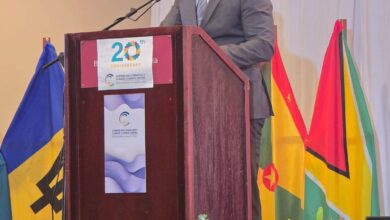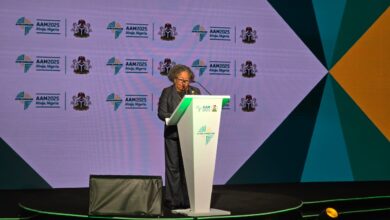His Excellency Jean Bertrand Aristide, President of the Republic of Haiti and Mrs. Aristide,
The Honorable Jean Marie Cherestal, Prime Minister,
The Honorable Yvon Neptune, President of the Senate,
The Honorable Pierre Paul Cottin, President of the Chamber of Deputies,
His Excellency Cesar Gaviria, Secretary General of the Organisation of American States,
Esteemed Members of the Senate and the Chamber of Deputies,
Esteemed Members of the Cabinet,
Distinguished Secretaires D’Etat
His Excellency Francklyn O’Brien Rolle, Ambassador the Commonwealth of the Bahamas in Haiti,
Other distinguished members of the Corps Diplomatique,
Distinguished representatives of international and regional organisations,
Distinguished leaders and representatives of political parties,
Distinguished heads and representatives of civil society organisations,
Distinguished members of the private sector,
Special invited guests,
Members of the media,
Ladies and Gentlemen,
Je vous souhaite la Bienvenue,
Ce sera une simple cérémonie, Ceci représente un pas géant dans l’histoire de la Caraibe.
C’est en effet, une occasion d’une proportion historique. Etant que Secrétaire-Général de la CARICOM, c’est pour moi un grand honneur, que cette opportunité me soit offerte de jouer un role capital dans cet evennement aussi grandiose qu’il soit . J’aurais aimé continuer en français mais ceçi s’avère très difficile pour moi, donc je vous prie de m’excuser car, je continuerai en anglais.
Mr. President, Ladies and Gentlemen,
Some four years ago (1997) this month, in response to a request by former President of Haiti Rene Préval, the Heads of Government of the Caribbean Community (CARICOM) at their Meeting in Montego Bay, Jamaica, agreed to admit Haiti as a member of CARICOM, subject to agreement on the terms and conditions necessary for membership of CARICOM. Two years thereafter, in July 1999, agreement was reached between the Government of Haiti and CARICOM on the terms and conditions of Haiti’s accession to CARICOM . At their February 2001 Heads of Government meeting in Barbados, particular attention was drawn to the importance of the Charter of Civil Society in this regard.
It remains now only for Haiti to ratify those conditions – a process which I have been advised, requires approval by its Parliament and the deposit of the necessary instrument of accession with the CARICOM Secretariat
Ladies and Gentlemen,
Today’s world is one characterised by groupings of States and peoples. Countries large and small have adopted this approach to pursuing their national and regional development. This is so, for example with the large developed countries such as Germany, France, United Kingdom, Italy, Spain as well as smaller countries such as Belgium Greece, Portugal, Ireland, Netherlands, and Luxembourg, all members of European Union. This is also the case with the United States, Canada and Mexico, comprising the North America Free Trade Area (NAFTA). But it is not only in developed countries that this phenomenon occurs. The countries of Brazil, Argentina, Paraguay and Uruguay have formed Mercosur. In Africa and in the Pacific there are many similar groupings among in most cases smaller countries.
An essential principle of this phenomenon is that members of the grouping are required to treat each other more favorably than they treat non-members.
The CARICOM which Haiti will soon join – I hope – is one such grouping among small developing countries. It has been based on three mains pillars – economic integration, foreign policy coordination among the members states, and functional cooperation in a numbers of areas of common interest such as health, education, women youth affairs and disaster management etc.
The CARICOM of today is, however, substantially different from the one established in 1973 with the signature of the Treaty of Chaguaramas. For example,
the group of four countries which originally signed the Treaty, has now grown to fourteen ;
while English remains the official language of CARICOM, already from 1995 with the entry of Suriname, the grouping is no longer only English speaking. Haiti’s expected accession will ensure that English is no longer the language of the majority of the peoples of CARICOM . That honour will fall somewhere between French and Creole as Haiti’s 8 million inhabitants will drastically transform the linguistic profile of CARICOM ;
from being a grouping of newly independent countries, CARICOM has evolved over the last quarter century into an important player on the hemispheric and the international stage, actively participating in and influencing the discussions on a wide range of critical social, economic and political issues (such as the situation here in Haiti, for example);
also, most importantly, the Common Market aspect of CARICOM is being transformed into a Single Market and Economy ( Marché unique) providing not only for the free movement of goods but also of services, capital and skilled labor as well as for the right to establish businesses throughout CARICOM .
It is in context of these enormous changes that Haiti is expected to take its place in the Councils of CARICOM and it is against that background and conscious of the adjustments it will need to make that the Heads of Government of CARICOM with the agreement of the Government of Haiti decided to establish the CARICOM Office in Haiti.
The Office will provide technical assistance to Haiti in three areas – Customs Administration and Trade Policy, Implementation of the Single Market and Economy, and Information and Communications.
Its objectives will be to assist Haïti in developing the capacity to play its full role in the Community through :
- Providing assistance to the Government of Haïti in order to enable Haïti to efficiently implement the Customs and Trade regimes of the Community when itassumes full membership.
- Facilitating the process of internal consultation in Haïti between the public, administration and non-governmental stakeholders, as well as to inform the public and private sectors of the implications and benefits of the various measures being implemented;
- Facilitating the exchange of information on developments in Haïti and in CARICOM, with a view to bringing Haïti and CARICOM closer together and ultiminately integrating Haïti into CARICOM.
Armed with this mandate from the Heads of Goverment, the Secretariat pursued the arrangements necessary to establish the CARICOM Office in Port au Prince, and, with no small contribution from the Bahamas and Norway, succeeded in placing the first two professional members of the Office Staff in Port au Prince on Sunday, June 10th, 2001.
Mr. Hayden Blades, former Executive Director of the Caribbean Agricultural Research and Development Institute, and a staff member of the CARICOM Secretariat over some twenty years (1974 – 1994), has been named as the Advisor, Single Market and Economy and Officer-in-Charge. Mr. Edward Alexander, former Special Advisor to the Prime Minister of Dominica with special responsibilities for Foreign Affairs and Information, and a practising media specialist for many years, has been named as Advisor in Information and Communications.
Other professional Services will be provided dependent on the needs of Haiti.
At this juncture, I wish to publicly thank the Government of the Bahamas – a CARICOM Member State for providing, free of cost, office accommodation for the CARICOM office. I also wish to express the gratitude of CARICOM to the Government of Norway for its substantial financial assistance without which it would have been difficult to establish the Office at this time.
My thanks would not be completed without my publicly acknowledging the assistance of the Government of Haiti itself, and the Bureau de Suivi in particular, for the great support it has been extending to the Office. We look forward to the completion of that process with the early conclusion of the Headquarters agreement between the Government of Haiti and CARICOM. Indeed, this CARICOM Office, when fully established, would be a truly collective international effort.
Mr. President, Ladies and Gentlemen,
The time has certainly come for Haiti to cast off the mantle of the hemisphere’s poorest and forge ahead with its Caribbean brothers and sisters. This would however require at least three major thrust by Haiti: an internal bonding among its people(s) under accountable governance ; a more equitable sharing of its resources and the opportunities; and a taking of its place – its rightful place – at the Councils of the Region and the hemisphere.
These are major objectives and require major and sustained initiative and support. Membership of CARICOM is one place where Haiti rightfully belongs, it is also one source of support on which Haiti can rely. Just last week ,at their meeting in the Bahamas, the CARICOM Heads of Government issued a statement on the process currently underway in Haiti towards the resolution of its political crisis, and the strengthening of its democracy. In that Statement, which I am advised is available to all, the Heads of Government, and I quote, “welcomed and expressed strong support for the progress towards an understanding between the Government of Haiti, Fanmi Lavalas, Convergence Democratique and the civil society. They urged all stakeholders to continue and increase their efforts in this regard”.
They also “urged President Aristide to continue his efforts to enhance the democratic space for this process and to provide the necessary accompanying measures leading to a climate in which a definitive resolution to the political crisis can be found”. In this regard they also ” welcomed the steps taken thus far by the Fanmi Lavalas and Convergence Democratique”.
They further urged “all political parties to constructively contribute to this process of reconciliation and resolution”, and emphasised the role of civil society organizations in this process and called upon them “to continue to remain engaged and contribute to the process of developing a Haitian solution to the political crisis”. They did all that while reminding them that “the people of Haiti are the main victims of this political crisis”, which has resulted in “a rapidly deteriorating social and economic situation”.
The Heads went one step further to call upon “the international community, especially the international financial institutions, to accompany this process of strengthening of democracy, by supporting the social and economic development with all means available to them in the form of technical and financial assistance, without further delay. (my emphasis.)
Ladies and Gentlemen,
I know that I have been long – at least longer than I had hoped to be – but I have been so because this matter is vital to CARICOM and dear to my heart. The process will never be perfect, but as the renowned Trinidadian scholar, writer and internationalist C. L. R. James once said to me after a heated debate with a leading regional thinker and political analyst that that thinker-analyst will settle for nothing but the best, and since he could never get the best he will always have to settle for “the nothing”. I appeal to all those involved in the process of political resolution here in Haiti not to fall victim to this disease of making the best the enemy of the good.
This Office may not be the best but it is good. It represents that holding off hands between Haiti and CARICOM. It is a historic opportunity which neither CARICOM nor Haiti can afford to squander.
Also let us never forget that MEN AMPIL CHAY PA LOU.
I THANK YOU.





